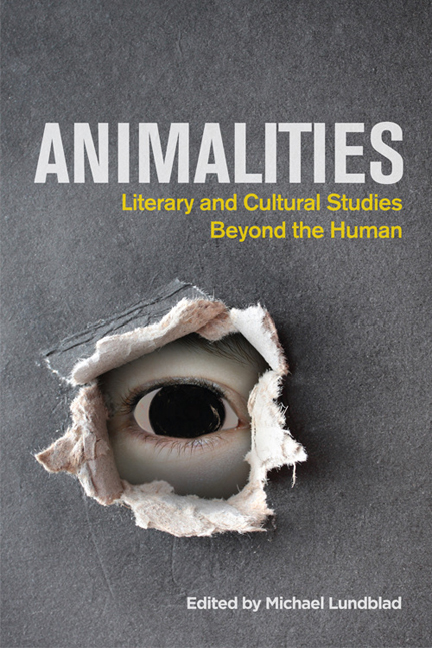Book contents
- Frontmatter
- Contents
- List of Figures
- Acknowledgments
- Introduction: The End of the Animal – Literary and Cultural Animalities
- 1 Each Time Unique: The Poetics of Extinction
- 2 Posthuman New York: Ground Zero of the Anthropocene
- 3 J. G. Ballard's Dark Ecologies: Unsettling Nature, Animals, and Literary Tropes
- 4 Staging Humanimality: Patricia Piccinini and a Genealogy of Species Intermingling
- 5 “Sparks Would Fly”: Electricity and the Spectacle of Animality
- 6 The Nature of Birds, Women, and Cancer: Terry Tempest Williams's Refuge and When Women Were Birds
- 7 Animality, Biopolitics, and Umwelt in Amitav Ghosh's The Hungry Tide
- 8 Looking the Beast in the Eye: Re-animating Meat in Nordic and British Food Culture
- 9 Love Triangle with Dog: Whym Chow, the “Michael Fields,” and the Poetic Potential of Human-Animal Bonds
- 10 Bestial Humans and Sexual Animals: Zoophilia in Law and Literature
- Notes on Contributors
- Index
5 - “Sparks Would Fly”: Electricity and the Spectacle of Animality
Published online by Cambridge University Press: 07 December 2017
- Frontmatter
- Contents
- List of Figures
- Acknowledgments
- Introduction: The End of the Animal – Literary and Cultural Animalities
- 1 Each Time Unique: The Poetics of Extinction
- 2 Posthuman New York: Ground Zero of the Anthropocene
- 3 J. G. Ballard's Dark Ecologies: Unsettling Nature, Animals, and Literary Tropes
- 4 Staging Humanimality: Patricia Piccinini and a Genealogy of Species Intermingling
- 5 “Sparks Would Fly”: Electricity and the Spectacle of Animality
- 6 The Nature of Birds, Women, and Cancer: Terry Tempest Williams's Refuge and When Women Were Birds
- 7 Animality, Biopolitics, and Umwelt in Amitav Ghosh's The Hungry Tide
- 8 Looking the Beast in the Eye: Re-animating Meat in Nordic and British Food Culture
- 9 Love Triangle with Dog: Whym Chow, the “Michael Fields,” and the Poetic Potential of Human-Animal Bonds
- 10 Bestial Humans and Sexual Animals: Zoophilia in Law and Literature
- Notes on Contributors
- Index
Summary
It was a queer, sultry summer, the summer they electrocuted the Rosenbergs, and I didn't know what I was doing in New York. I'm stupid about executions. The idea of being electrocuted makes me sick, and that's all there was to read about in the papers – goggle-eyed headlines staring up at me on every street corner and at the fusty, peanut- smelling mouth of every subway. It had nothing to do with me, but I couldn't help wondering what it would be like, being burned alive all along your nerves.
I thought it must be the worst thing in the world.So begins Sylvia Plath's novel The Bell Jar (1963). Its rather flippant opening – “they electrocuted the Rosenbergs, and I didn't know what I was doing in New York” – that equates the seriousness of Cold War politics and national security with petty girlhood tribulations is, in fact, a triumph of literary compression. The Rosenbergs’ electrocution, it will turn out, has everything to do with the novel's narrator and main character Esther Greenwood's own fate, hospitalized in a number of psychiatric institutions to undergo a series of electroconvulsive therapy (ECT) treatments.
From ECT to electrical execution, electricity exudes ambivalent powers: visible and imperceptible, life giving and lethal, healing and punitive. In his cultural history of electricity in America, David Nye claimed that “despite its ubiquity, electricity seemed to defy definition, and remained a mystery to the citizenry that saw it every day in the street.” Electricity is also thoroughly modern: “After the Russian Revolution Lenin proclaimed that only when the Soviet Union had been completely electrified could full socialism be attained.” In the free world, Darius Rejali has shown how, as an instrument of stealthy bodily control, electricity is characteristically democratic: it suits open societies in which public scrutiny provides legitimacy to power under the auspices of human rights discourse.
- Type
- Chapter
- Information
- AnimalitiesLiterary and Cultural Studies Beyond the Human, pp. 104 - 126Publisher: Edinburgh University PressPrint publication year: 2017



